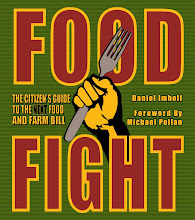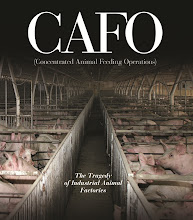Outside of First Lady Michelle Obama’s “Let’s Move”
campaign to urge kids to exercise more and eat better, this administration
remains largely indifferent to the disaster that is the country’s outdated food
and agriculture policy. USDA Secretary Tom Vilsack recently argued that rural America
has become politically irrelevant—a possible explanation for why the House
refused to even consider a vote on a new Farm Bill last year. Maybe it’s something
else. It could be that the present
Congress and Administration are simply clueless about the severity of our food
and farming crises.
Riding the coattails of the fiscal cliff bargain, the 2008
Farm Bill—three months past its “renew by” date—got a nine-month extension
shortly after New Year’s Day. The
extension could have included funds to preserve programs that help rural
America and rebuild a food and farming system around the challenges of the 21st
century. Instead, the policy—concocted in backdoor fashion without any public
input—might as well have been written by lobbyists from the crop insurance,
finance and agrochemical industries.
The Farm Bill extension bears little resemblance to the
plan hotly debate and passed by the Senate last summer. While by no means
ideal, that Senate plan would have clipped excessive commodity subsidies and
reduced but still preserved important programs for conservation, organic
agriculture, and rural development. This Farm Bill extension will continue
sending $5 billion in direct payments to landowners whether they farm or not,
whether they experience losses or not. (Both Republicans and Democrats favor
eliminating such subsidies.) By extending rather than writing a new five-year Farm
Bill, Congress did, however, manage to avert the dreaded “dairy cliff.” This
would have reverted to a 1949 dairy subsidy program causing milk prices to
spike to about $7 a gallon.
Kicking the Farm Bill down the road means we continue to invest
in a backward agriculture policy. Because nothing was done to reform cotton
subsidies, the US will continue to send $150 million in 2013 to Brazilian
cotton farmers. This is the result of a lingering World Trade Organization
ruling that declared previous US cotton supports trade distorting. Meanwhile,
as Brazilian farmers benefit from the Farm Bill extension, the big losers are
dozens of programs that train the next generation of US farmers and ranchers,
invest in on-farm renewable energy, assist organic growers, expand farmers
markets, and rebuild the infrastructure of a regionally-diversified food
system.
Contrary to what many might think, the US faces a mounting
list of rather alarming food and farming related challenges. Over 15 percent of
the American population—mostly retired, disabled, children or
underemployed—depend on food stamps, the largest budget item in the Farm Bill.
Last year’s severe drought affected two-thirds of all agricultural counties,
impacting crop yields, raising grain prices, and forcing livestock owners to
sell off herds. Unpredictable weather patterns, we are told, are now the norm. “Superweeds”
occupy 60 to 80 million acres of the country’s farmland as a result of a
large-scale shift to genetically engineered, herbicide-resistant crops. Our
research budgets into innovative farming strategies to address such problems are
shrinking rather than expanding.
The Farm Bill exists to address problems, like these, that
are not easily solved by the free market. A smarter Farm Bill would offer assistance
to farmers to take care of natural resources, help for those who can’t get
enough to eat, and funding for forward-thinking research to help farmers stay
ahead of environmental challenges.
The good news is that the door is not yet closed on a Farm
Bill. The most recent short-term extension means that a new five-year Farm Bill
could be written and voted on by September. Despite “Farm Bill fatigue” setting
in among many citizens who care about agriculture policy, the time to set the
terms of this debate is now, as Congress struggles with the challenge of fiscal
austerity and the national debt. We still have the opportunity to make the changes
necessary for a healthier, more secure, and conservation-based food system. Representatives
need to repeatedly hear our concerns.
Here are a few ideas that voters should be pestering the
113th Congress about:
Full funding for conservation programs to protect topsoil,
clean air, fresh water and safeguard natural habitat;
Reform of the crop subsidy rules to exclude millionaires
from government handouts and limit how much an individual entity can receive;
Changes to crop insurance including limits on federal
funding to insurance companies and strict environmental stipulations for
farming operations that enroll;
Expanded support for sustainable and organic agriculture
through cost-share programs, research, and market development;
Continuation of programs that invest in a new generation
of farmers and ranchers;
Initiatives aimed at increasing the
accessibility and affordability of healthy nutritious foods, particularly among
the young and aging.
Holding our collective breath for change won’t help. The
healthy food movement needs to speak more loudly and preferably in unison on
these issues. Otherwise we’ll get more of the same: food and agriculture policy
that is clueless about the real problems we face in the years ahead.
Follow the Farm Bill discussions at









